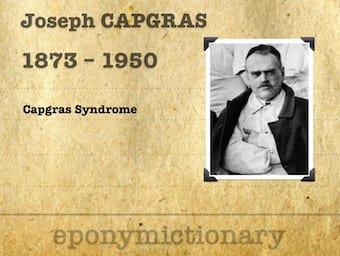
Capgras syndrome
Capgras syndrome: uncommon syndrome in which a patient has a delusional belief that a person, usually a family member or friend, has been replaced by an imposter.

Capgras syndrome: uncommon syndrome in which a patient has a delusional belief that a person, usually a family member or friend, has been replaced by an imposter.

French psychiatrist, Jean Marie Joseph Capgras (1873-1950) best known for his description 'syndrome d’illusion des sosies', Capgras syndrome in 1923

Jules Cotard (1840 - 1889) was a French neurologist and psychiatrist. Délire de négations - Cotard Syndrome (1882)
Biography Medical Eponyms Key Medical Attributions Major Publications References

Ekbom syndrome or delusional parasitosis is characterised by delusions, symptoms of formication and signs such as self-mutilation or the matchbox-sign

Psychiatric illnesses remain among the most mysterious maladies that doctors encounter. This enthralling TED talk by inspiring medical historian and surgeon Sherwin Nuland gives a detailed account of one man's illness.

Sigbert Josef Maria Ganser (1853 – 1931) was a German psychiatrist. 'Ganser syndrome' an hysterical disorder he first described in 1898

Cotard syndrome: A rare condition characterized by nihilistic delusions, where a patient believes that they are dead, have missing organs, or have decaying or failing body parts.

The stress and trauma associated with what you do is real and it affects how you perform. Jannie Geertsema chats Jellybean style about Abnormal Treatment Behaviour

Jean-Pierre Falret (1794 - 1870) was a French psychiatrist. Falret studied depression and suicide for 32 years and recorded cycles of depression and of elation which he named maladie circulaire and which is more commonly termed bipolar disorder

Jules Philippe Falret (1824 - 1902) was a French psychiatrist. 1877, along with Ernest-Charles Lasègue (1816-1883) first described the concept of Folie à deux, initially termed Lasègue-Falret syndrome.

Karl-Axel Ekbom (1907-1977) Swedish neurologist. Eponym: Willis-Ekbom syndrome (Restless leg syndrome); Ekbom Syndrome II (Delusion of parasitosis)